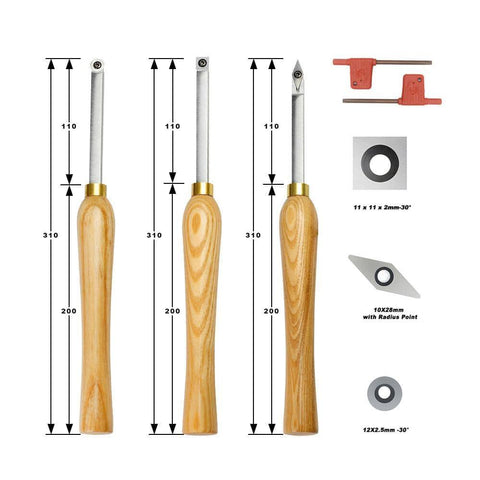Choosing the Perfect Wood for Woodturning: A Guide to the Best Types
Woodturning is an art form where the material plays as much a role as the skill and tools used. Choosing the right wood can mean the difference between a satisfying, seamless turning experience and a challenging, frustrating one. Each type of wood has unique characteristics that affect its suitability for specific projects, so understanding these nuances can elevate your work from good to exceptional. Whether you're crafting a delicate spindle or a robust bowl, here's a look at some of the best woods for woodturning and why they stand out.
Maple is a favorite for woodturners due to its hardness, workability, and beautiful grain. Hard Maple, also known as Sugar Maple, has a fine, even grain that's ideal for projects requiring a smooth finish, like bowls and furniture pieces. Soft Maple, on the other hand, is slightly easier to turn and is great for beginners. Both types are versatile and showcase unique patterns, especially in figured varieties like Birdseye or Curly Maple, adding visual interest to your finished pieces.
Walnut is another popular choice that's valued for its rich, dark brown color and fine, straight grain. Its medium density and workability make it easy to turn and finish, while its durability ensures that projects like bowls, handles, and furniture components will withstand the test of time. Black Walnut, in particular, is sought after for its deep, warm tones that deepen over time, creating an elegant, timeless look.
Cherry wood is known for its warm red-brown hue and smooth grain, and it's a go-to for woodturners looking for beauty and ease of turning. It's slightly softer than Maple or Walnut, but this softness makes it a pleasure to work with, especially for beginners. Cherry wood is often used in decorative items, bowls, and lidded boxes, and it darkens with age, creating a beautiful, vintage aesthetic. Its smooth surface accepts finishes well, adding a rich glow to turned pieces.
Ash is a durable wood with a straight, open grain that lends itself well to larger projects. It has excellent shock resistance, making it ideal for functional items like tool handles, bowls, and furniture legs. Ash is easy to turn and finishes nicely, often revealing a striking grain pattern. It can be a little challenging to sand due to its porous structure, but with a bit of patience, it produces stunning results. For those looking for durability and style, Ash is a solid choice.
Oak, especially Red Oak and White Oak, is widely available and has a distinct grain that adds texture and visual appeal to turned projects. It's a tough wood that can be challenging for beginners but is rewarding with practice. Red Oak tends to be more porous, which can affect its finish, while White Oak is denser and water-resistant, making it suitable for items like bowls or containers that may come into contact with liquids. Oak's durability and beautiful grain make it ideal for statement pieces, though it may require some skill to master.
For woodturners interested in exotic woods, Cocobolo and African Blackwood are excellent options. Cocobolo is known for its striking color palette, which ranges from orange to deep brown, often with dark, streaky veins. It's dense and oily, making it easy to polish to a high gloss, perfect for decorative items like pens and intricate inlays. African Blackwood, a relative of Ebony, is very hard and fine-grained, allowing for precise, detailed work. Both woods are prized for their aesthetics but are typically used in small, detailed projects due to their density and cost.
For beginners and practice pieces, consider softer, affordable woods like Pine and Poplar. These are easy to turn and widely available, though they may lack the durability and intricate grain of hardwoods. Pine's light color and soft grain make it easy to shape, while Poplar has a smooth, even texture that's forgiving for new turners. While not as visually striking as other woods, they're ideal for learning basic techniques and building confidence on the lathe.
Selecting the right wood for woodturing is about understanding the unique qualities of each type and matching them to your project's needs. By choosing woods that align with the demands of your design, you'll enhance both the beauty and durability of your work, making each turned piece a true testament to your craft.

